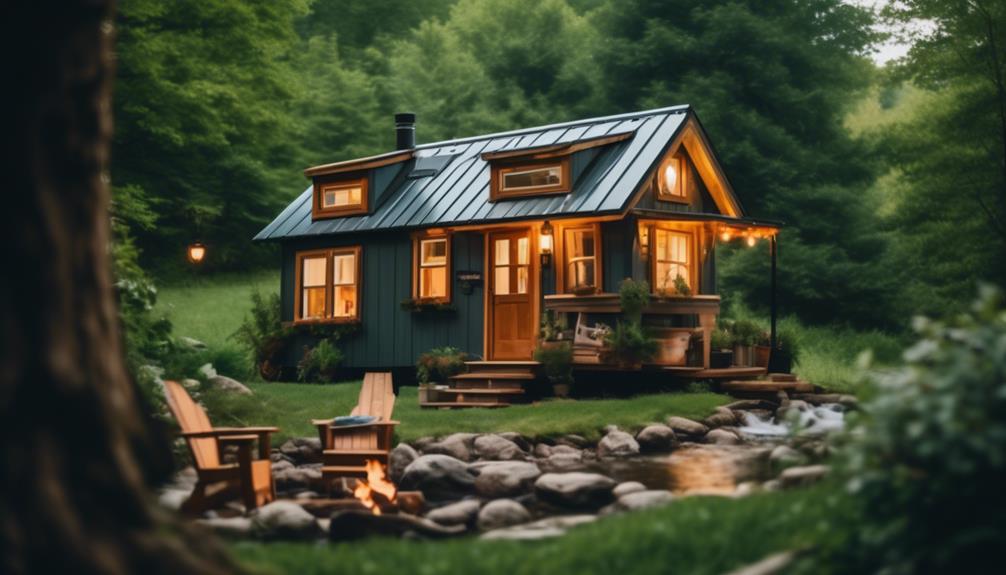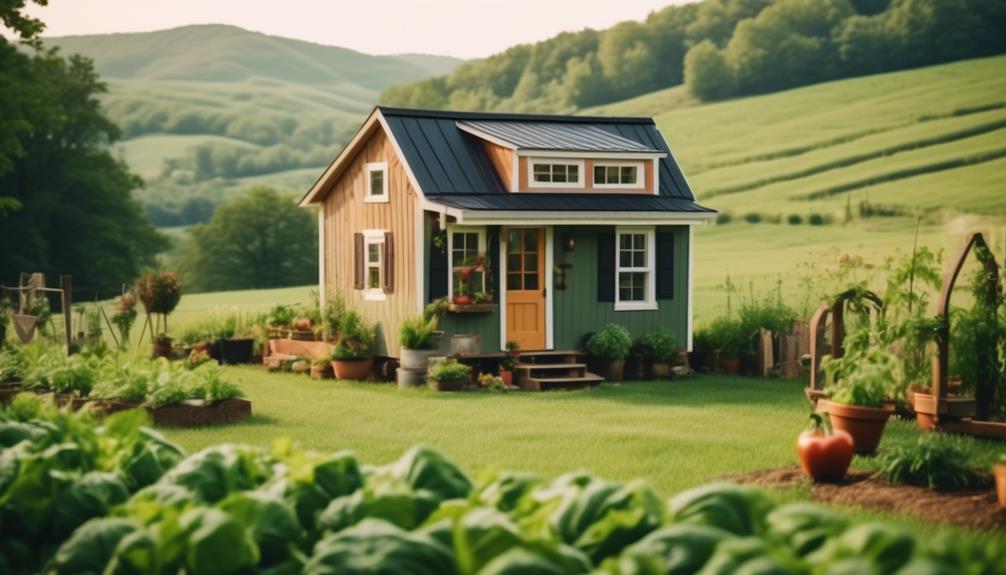Nestled in the scenic beauty of West Virginia, a hidden oasis awaits those seeking an alternative way of living. The tiny house movement, gaining momentum in the state, offers an escape from the complexities of modern life and invites individuals to embrace a simpler, more sustainable lifestyle.
But before you embark on this journey, there are legalities to consider and challenges to overcome. In this article, we will explore the regulations surrounding tiny houses in West Virginia, uncover the costs associated with this minimalist lifestyle, and reveal the cities that welcome tiny homes with open arms.
Stay tuned to discover the possibilities that await in this tiny house oasis.
Key Takeaways
- Tiny houses in West Virginia are sometimes legal, but it depends on local zoning and building codes. Researching and complying with local regulations is important.
- Some cities in West Virginia, such as Kanawha City, Parkersburg, and Winfield, have adopted regulations or zoning ordinances that accommodate tiny houses.
- The cost of a tiny house in West Virginia can range from $24,000 to $100,000, depending on factors such as size, materials, customization, and additional features.
- There are builders and trailer dealers near West Virginia, such as Build Tiny Construction, Hobbitat Spaces, Modern Tiny Living, Gatormade Trailers, Mountaineer RV & Trailer Sales, and Jarco Trucks & Trailers Sales, that can provide services for tiny house enthusiasts in the state.
Overview of Tiny House Regulations in West Virginia
Navigating the regulations surrounding tiny houses in West Virginia can be a complex yet crucial step for those considering the minimalist lifestyle.
One of the challenges faced by tiny house enthusiasts in West Virginia is the need to amend existing regulations to accommodate this emerging housing trend. Efforts are being made to create new laws and zoning ordinances that specifically address the unique requirements of tiny houses.
Additionally, it is important to distinguish between permanent and mobile tiny houses in West Virginia. Some areas may allow permanent tiny houses on foundations, while others may require them to be classified as accessory dwelling units. Understanding these distinctions can help individuals comply with local regulations and successfully pursue their dream of living in a tiny house in West Virginia.
Factors Affecting the Cost of Tiny Houses in West Virginia
The cost of a tiny house in West Virginia can vary depending on factors such as size, materials used, customization, and additional features. These factors play a significant role in determining the overall cost of a tiny house project. To better understand the influence of these factors, let's take a look at the table below:
| Factors Influencing Tiny House Cost | Description |
|---|---|
| Size | The larger the tiny house, the more materials and labor will be required, resulting in a higher cost. |
| Materials Used | The choice of materials, such as high-quality wood or eco-friendly alternatives, can impact the cost of the tiny house. |
| Customization | Adding personalized touches and unique features to the tiny house can increase the overall cost. |
| Additional Features | Including amenities like solar panels, composting toilets, or off-grid systems can add to the cost but provide long-term benefits.
Considering these factors, it is essential to weigh the benefits of tiny house living against the cost. While the initial investment may seem significant, the long-term savings on utilities, maintenance, and mortgage payments can make tiny house living a financially wise choice. Additionally, the freedom to live more sustainably, with a smaller carbon footprint and the opportunity for a minimalist lifestyle, adds value to the overall experience.
Tiny House Friendly Cities in West Virginia

Considering the factors that influence the cost of a tiny house in West Virginia, it is important to explore the cities in the state that are known for being friendly towards tiny house living. Here are four cities in West Virginia that have adopted regulations or zoning ordinances to accommodate tiny houses:
- Kanawha City: This city has specific requirements for size, foundation type, and placement of tiny houses.
- Parkersburg: Parkersburg has approved a specific zoning district for tiny houses, with size and location restrictions.
- Winfield: Winfield allows tiny homes in certain zones, with minimum size requirements and restrictions on residential zones.
- Morgantown: Morgantown has a comprehensive zoning code that allows for accessory dwelling units, which can include tiny houses.
These cities provide more options and support for individuals interested in living in a tiny house in West Virginia. By choosing a tiny house friendly city, residents can enjoy the benefits of tiny house living while navigating the necessary zoning restrictions.
Builders and Trailer Dealers for Tiny Houses in West Virginia
When looking to build or purchase a tiny house in West Virginia, there are several reputable builders and trailer dealers that can assist in making your tiny house dreams a reality.
Some of the top tiny house builders in West Virginia include:
- Build Tiny Construction in Berryville, VA, which offers custom workshops, building guidance, and ready-built tiny homes.
- Hobbitat Spaces in Oakland, MD, specializing in designing and building unique tiny homes using reclaimed materials.
- Modern Tiny Living in Columbus, OH offers a range of prefabricated designs and customization options for tiny houses.
When it comes to trailer dealers for tiny houses in West Virginia, there are a few options to consider:
- Gatormade Trailers in Bowden, WV offers a range of trailers including utility, enclosed, flatbed, and equipment trailers.
- Mountaineer RV & Trailer Sales in Vienna, WV provides utility trailers, dump trailers, cargo trailers, and more.
- Jarco Trucks & Trailers Sales in Fairmont, WV sells enclosed cargo, utility, dump, car haulers, and equipment trailers.
These builders and trailer dealers are located near West Virginia and can provide services to residents in the state. Whether you are looking for a custom-built tiny house or a trailer to transport your tiny house, these reputable builders and trailer dealers can help you bring your tiny house dreams to life in West Virginia.
Farming and Homesteading Resources in West Virginia

With a focus on simple living, self-sufficiency, and the joys of rural life, West Virginia offers a wealth of resources for those interested in farming and homesteading. Here are some of the farming and homesteading resources available in West Virginia:
- West Virginia Farming Techniques: Learn about the unique farming techniques that are specific to West Virginia's climate and terrain. Discover innovative ways to maximize yields and minimize inputs.
- Homesteading Tips and Tricks: Get insider tips and tricks from experienced homesteaders in West Virginia. Learn how to grow your own food, raise livestock, and create a sustainable and self-sufficient lifestyle.
- West Virginia Farming and Homesteading Community: Join a supportive community of like-minded individuals who share your passion for farming and homesteading. Connect with fellow farmers and homesteaders, share ideas, and learn from each other's experiences.
- Workshops and Seminars: Attend workshops and seminars led by experts in the field of farming and homesteading. Learn new skills, gain valuable knowledge, and stay up-to-date with the latest practices and techniques.
Whether you're a beginner looking to start your own homestead or an experienced farmer seeking to expand your knowledge, West Virginia has a wide range of resources to support your farming and homesteading journey.
Frequently Asked Questions
Are There Any Specific Restrictions on the Design or Style of Tiny Houses in West Virginia?
In West Virginia, there are no specific restrictions on the design or style of tiny houses, allowing for design flexibility and creativity. However, it is important to comply with local building codes and regulations.
Can I Live in a Tiny House on Wheels Full-Time in West Virginia?
Living in a tiny house on wheels full-time in West Virginia offers an alternative lifestyle with lower living expenses. However, it is important to research local regulations and zoning ordinances to ensure compliance and a seamless transition to this innovative living arrangement.
Are There Any Financial Incentives or Grants Available for Building a Tiny House in West Virginia?
Financial incentives and grants for building a tiny house in West Virginia are not widely available. However, there may be local programs or organizations that offer assistance. It is important to research and reach out to local authorities and resources for potential opportunities.
How Long Does It Typically Take to Build a Tiny House in West Virginia?
Building timelines for tiny houses in West Virginia vary depending on factors such as size, complexity, and availability of resources. Generally, it can take anywhere from a few months to a year to complete a tiny house project. Cost considerations include materials, labor, and customization choices.
Are There Any Zoning Restrictions on Parking or Placing a Tiny House in Residential Areas?
Zoning restrictions and parking regulations for tiny houses in residential areas vary depending on local regulations in West Virginia. It is important to research and comply with these regulations before parking or placing a tiny house in a residential area.
Conclusion
In conclusion, West Virginia offers a promising landscape for those interested in the tiny house movement.
While navigating the various regulations and zoning ordinances may pose a challenge, the state has made efforts to accommodate this minimalist lifestyle.
With the support of tiny house-friendly cities, reputable builders, and resources for setting up communities, West Virginia provides a serene oasis for those seeking a simpler way of living.
Embrace the charm and tranquility of tiny house living in the heart of Appalachia.

